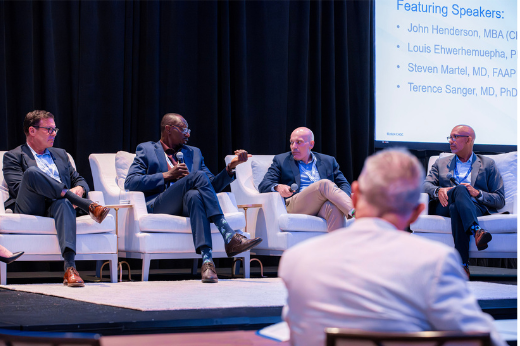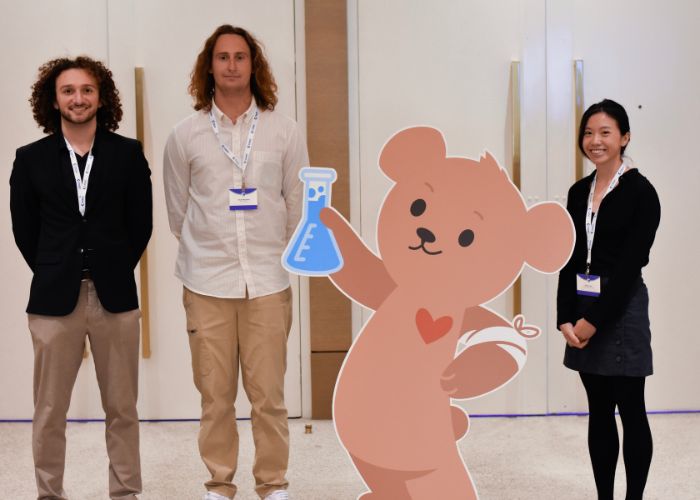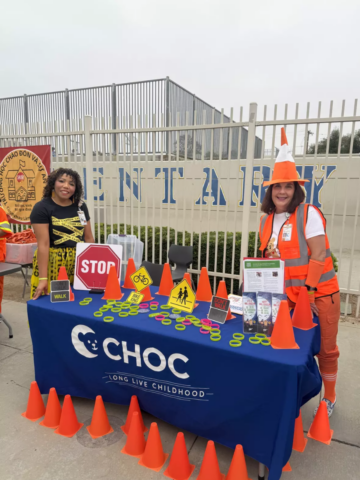A recent multidisciplinary roundtable hosted by the CHOC Research Institute gathered experts in medicine, data science and implementation science, as well as patient families, to address pressing challenges in pediatric and lifespan research.
Held May 23 and 24, the inaugural Pediatric and Lifespan Data Science Conference was envisioned to share information on ways to optimize research methodologies handling copious amounts of multimodal data, now possible due to the advent of electronic health records (EHR), wearable devices, and artificial intelligence (AI) for inference, prediction, and understanding of optimal treatment policies.
The interdisciplinary event brought together experts in medicine, data science, implementation science, and members of the institute’s family advisory council.
Dr. Terence Sanger and Dr. Louis Ehwerhemuepha developed the event with a s shared vision to conduct research across a patient’s lifespan for improved overall health outcomes.
First day of event
The conference began with Dr. Ehwerhemuepha reminding the audience about its purpose. He stressed the need for collaboration between pediatric and adult medicine toward improved lifespan data science research and that the conference ought to effect change.
“This should not be just another conference but one through which the quality of care of patients can be improved and reported on within a year,” he said.
“The conference reminds us that pediatric health becomes adult health and gave attendees the opportunity to network and exchange ideas and identified prospects for future collaborations,” said Dr. Steven Martel, CHOC’s chief health information officer.
Keynote address
Dr. Leo Anthony Celi – senior research scientist at MIT, staff physician at Beth Israel Deaconess Medical Center, and associate professor of medicine at Harvard University – delivered the keynote address.
“The biggest challenge to delivering on the hype that has been created by industry and the media is the lack of understanding of the backstory of the data prior to developing models,” Dr. Celi said. “Fairness evaluation should take place at every step of the life cycle, which starts way before the exploratory data analysis. The application of AI to healthcare is not just about building models and optimizing some point estimates. It requires the collective wisdom of different actors, including patients and their caregivers.”
He echoed the need for academic and medical communities to better understand AI to mitigate the risk of bias and inequity.
He expressed his support of recent regulations from the U.S. Department of Health and Human Services that prohibit algorithmic discrimination by health care providers and payers, while noting that the breadth of AI applications poses a challenge for regulatory enforcement.
He cautioned that no model deployed for clinical use is of insignificant risk due to a complexity of factors, both computational and human, that plague model-driven clinical outcomes.
Panel discussions
The conference proceeded with more than five panel presentations on the first day, beginning with one focused on sepsis led by Dr. Sandip Godambe, CHOC chief medical officer.
Dr. Godambe provided participants with a clinical understanding of sepsis and the need to combat it while mitigating negative effects on patients.

CHOC’s Dr. William W. Feaster and Dr. Sandip Godambe pose with panelist Robert Sepanski from Children’s Hospital of The King’s Daughter.
Added Dr. Godambe: “The sepsis panel illuminated the multifaceted nature of sepsis, encompassing its definition, detection, prediction, treatment, and the subsequent quality of life post-sepsis,” adding that “the panel provided a platform to examine decision support tools and the potential of improvement science.”
Dr. Godambe highlighted the critical importance of conducting these discussions within a safe, educationally enriching, and patient-centered environment, as facilitated by the conference.
He expressed optimism regarding the nascent collaborations formed during the conference, anticipating that these partnerships could significantly enhance sepsis outcomes at CHOC and beyond.
The panel covered clinical assessment and decision support needs across all care settings by including Dr. Robert Kelly, a critical care specialist and medical director of CHOC’s cardiovascular intensive care unit (CVICU) and Dr. Raina Paul, a CHOC emergency medicine physician, as well as clinicians from other hospitals and health systems throughout the country: Dr. Elizabeth Killien (Seattle Children’s Hospital), Dr. Rachel Marano (Rady Children’s Hospital), and Robert Sepanski (Children’s Hospital of The King’s Daughter in Virginia).
Dr. Micaela Thordarson, an event moderator and CHOC psychologist; Dr. Hoang “Wayne” Nguyen, pediatric psychologist and medical director of the Cherese Mari Laulhere Mental Health Inpatient Center; Dr. Michael Chu, a CHOC psychiatrist; and UCI’s Dr. John Luo) provided consideration of the potential for AI to bridge gaps in mental healthcare.
The neuroscience panel was moderated by Dr. Adam Z. Kalawi, CHOC pediatric neurologist, with presentations from CHOC pediatric neurologist Dr. Daniel Shrey, CHOC pediatric neurologist Dr. Sharief Taraman, UCSF’s Dr. Danilo Bernardo and UCI’s Dr. Megan Peters on the intersection between AI and neuroscience, epilepsy, and autism.
Topics on health equity, the equitable use of AI, and advancing data science were covered across two panels including Dr. Michael Weiss, vice president of population health at CHOC; Dr. Sharonne Herbert, CHOC’s belonging, diversity, equity and inclusion officer; CHOC pediatrician Dr. Zeev Kain; CHOC hospitalist Dr. Britanny Winckler; Dr. Ehwerhemuepha; Dr. Abdul Shaikh (Amazon Web Services); Dr. Lindsey Jarrett (Center for Practical Bioethics); Dr. Vijaytha Muralidharan of Stanford University; Dr. Angela Shippy of AWS; Katie Kalvoda of Advance OC); Suzy Engwall and Dr. Rebecca Rosen of NICHD.
CHOC families’ perspective on AI
The second day began with a welcome note from Dr. Ehwerhemuepha and Dr. Coleen Cunningham, CHOC senior vice president and pediatrician-in-chief.
This was followed by a panel with a family advisory council led by Dr. Charles Golden, CHOC vice president and assistant chief medical officer, with support for CHOC families from Sandra Cortez-Schultz, CPXP, CHOC’s executive director of Patient and Family Experience.
The families, Dr. Golden said, “are populated by a group of sophisticated parents of children with complex medical conditions who have used their experience with the healthcare system as an opportunity to give back and help improve things for the next patients that need it.”
Insights from parents
The parents were primarily concerned about using AI and analytics to reduce the turnaround time for insurance approvals for referrals; to improve transition of care; to analyze longitudinal multimodal data on medically complex patients; and to analyze data related to the treatment of rare diseases.
The families said AI could have helped them in many ways including gaining useful knowledge about their children’s conditions; optimizing their appointments; summarizing medical literature on pertinent conditions; automatically tracking key data and information on their children’s conditions; reducing the frequencies of misdiagnoses and bad data during care; and provide personalized medicine by accounting for what should be considered normal among medically complex patients.
They hoped that soon these challenges could be solved using AI and advanced analytics.
The parents also shared their concerns around AI and recommended that decision makers ensure that AI is used in ways that preserve the empathy of the physician and do not replace the human touch needed most at certain times in their journey.
Their discussion centered on reducing disparities; enhancing clinical efficiency; supporting precision medicine; maintaining human connections; improving communication and education; facilitating coordination and transition of care; and balancing technology with privacy and security.
Other events of the second day
The second day continued with discussions on the use of real-world EHR data for research across the lifespan with Dr. Mark Hoffman of Children’s Mercy, Kansas City as moderator and panelists including Dr. Dena Jaffe of Oracle Health in Israel, Dr. Jeffery Thompson of University of Kansas Medical Center, Dr. Joan Devin of Rotunda Hospital in Ireland, Dr. Rebecca Rosen of NICHD, and Dr. Nikolas Koscielniak of Patient Centered Outcomes Research Institute.

Conversations around integrating data science to improve neonatal and cardiovascular health outcomes were led by Dr. Martel and included Dr. Michel Mikhael, CHOC neonatologist; Dr. Wyman Lai, a CHOC pediatric cardiologist; Dr. Hamilton Baker of Clemson and Medical University of South Carolina; and Dr. Keith Feldman of Children’s Mercy, Kansas.
This was followed by a panel of CHOC data science leaders – Dr. Sanger, Dr. Martel, Dr. Ehwerhemuepha, and John Henderson, CHOC vice president and chief information officer – on how to build high-performing data science teams that can lead to improved outcomes.
The panelists stressed the need for interdisciplinary teams, diversity, and executive leadership engagement.
The last panels included discussions on large language models in healthcare; precision health; and the use of machine learning.
Hands-on data science session and industry support
During both days, a Datathon event was held with students from Chapman University, UCI and other Southern California universities and organizations collaborating on hands-on analysis of data on predicting sepsis.

Participants estimated the community-level effect of chronic condition prevalence on clinical outcomes and efficient analysis of large, whole-slide imaging of pathology images in gastroenterology.
The Datathon provided participants access to fully deidentified data while introducing them to the world of pediatric data science.
Participants gained insights and knowledge about challenges in analyzing real-world EHR data. Their contribution provided helpful findings that will be expanded upon by the Research Data Science unit at CHOC led by Dr. Ehwerhemuepha
The conference also included presentations from selected student representatives from the Datathon who provided feedback to conference participants.
Closing remarks
Dr. Sanger closed the conference by remarking on the differences between pediatric and adult medicine, indicating that in pediatrics emphasis is on time and growth.
He mentioned a common statement in pediatrics, “children are not just small adults,” adding that “adults are also not just big children.”
Dr. Sanger noted the clear differences between both worlds while emphasizing that there are similarities and connections between both pediatric and adult medicine.
He stressed that the vision of the conference was to bring a focus on how to collect data across the lifespan of a patient, aggregation of data from multiple patients, and how the data collected can be used to accelerate novel research findings, prediction models, and the application of reinforcement learning for learning optimal treatment patterns to impact decisions specific to a patient and across populations of patients.
Dr. Sanger echoed the need to identify and reduce inequities and bias in healthcare, and the critical need to utilize AI with exacerbating issues around equity. To achieve this, Dr. Sanger recommended that clinicians need to use information on patients across the lifespan instead of cut-offs in the pediatric or adult age ranges.
He stressed that it was important to discuss the exciting challenges of doing so, “but that in solving them, what we are going to learn about healthcare and health and biology is going to be tremendous.”
Dr. Sanger described the networking that took place during the conference among people of diverse backgrounds as exciting and promising for healthcare.
He concluded that “we have a lot more work to do. This is, hopefully, the first of many more meetings of this type but more importantly, this plants the seeds of inquiry in everyone, which will lead to passion that solves the problems of lifespan data science.”
The CHOC Research Institute will host the next pediatric and lifespan data science conference on April 10 to 11, 2025.

Learn about pediatric research and clinical trials at CHOC




